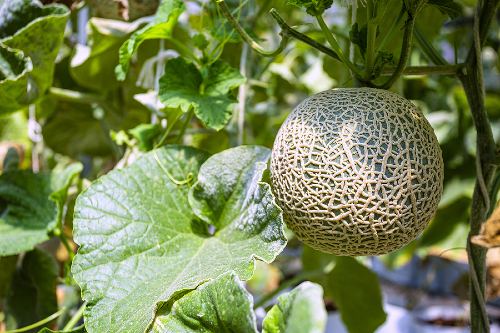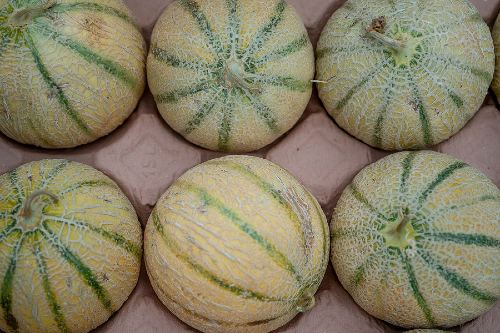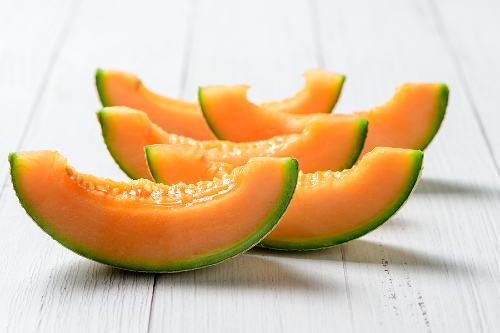Cantaloupes, or muskmelons, are available in Georgia May through October. Check out our newest “What’s In Season?” blog to learn more about this fruit and how to enjoy it this summer!
What sets cantaloupe apart?
Cantaloupe is a melon like watermelon and honeydew. Melons belong to the fruit subgroup of Berries and Summer Fruits. These fruits are known for being a great source of vitamins and minerals and for having a high water content.
Learn more interesting facts about cantaloupe below:
- Staying hydrated doesn’t have to be boring. Cantaloupes are 90% water with lots of juice to help keep you hydrated! [1]
- Cantaloupes belong to the “cucurbit family” of produce. Other fruits and vegetables in this family are watermelons, cucumbers, squash, and pumpkins. [2]
- Cantaloupes are high in nutrients such as Vitamin C, magnesium, and potassium. [3] Vitamin C keeps our immune system strong to help in fighting off disease. [4] Magnesium and potassium both play important roles in muscle and heart health. [5] [6]
- Did you know that cantaloupes are also called “rockmelons?” This is because the fruit looks like a rock before you cut into it. [7]

Harvested in Georgia
Georgia cantaloupe is mainly grown in the southern region of the state. [2] June, July, and August are the peak sweetest months to enjoy this melon. [7] If you are interested in purchasing locally grown cantaloupe, click here to find a local Georgia farmer near you. For more information on when to buy produce when it is in season, check out our “What’s In Season in Georgia” chart.
The textured outside of a cantaloupe is often referred to as “netting.” When buying a cantaloupe, look for a medium-sized melon with netting that is above the surface. [2] Ripe cantaloupes should smell sweet. If they don’t, they probably are not ready to eat. [1] A ripe cantaloupe can be kept fresh in a refrigerator for up to a week. [1]
The rough exterior of cantaloupe is a hiding place for dirt and bacteria. [8] This makes it easy for food-borne illnesses to spread to the inside of the fruit from a knife blade. Before cutting into a cantaloupe, be sure to scrub the outside of the melon with a vegetable brush while running it under water. [1] Once it is cut, store cantaloupe in the refrigerator in an airtight container. [1]

Cantaloupe Recipes
Depending on the size of the cantaloupe you buy, you may be looking for a few different ways to enjoy it. Here are a few quick and simple cantaloupe recipes that are perfect for summer:
- Melons pair great with lime juice and mint. Cut your favorite melon into chunks (cantaloupe, watermelon, honeydew, or a combination of all three!) and place them in a bowl. Squeeze lime juice over the top and toss with torn mint leaves for a refreshing fruit salad. In the mood for flavored water instead? Place each of these ingredients into a pitcher with 8 cups of water. Chill for 20 minutes and enjoy a hydrating beverage!
- This Fruit Dip can be served alongside pretty much any fruit you like. Why not enjoy it with fresh cantaloupe while they are in season?
- This Cantaloupe Cooler recipe couldn’t be easier. Simply add four ingredients to your blender or food processor, blend, and drink!
- Add cubed cantaloupe to this Cherry Salad recipe for a new favorite side dish to bring to your next cookout or pool party.
- Are you a cantaloupe purist? Simply slice the melon into smile-shaped wedges (as seen in the photo below) and enjoy!

Check back next month to see what fruit or vegetable is featured next!
Written by Darci Bell, RDN, LD | Edited by Leslie Davis, RDN, LD, CDCES, and the Nutrition Team
Posted: August 1, 2022
[2] Georgia Department of Agriculture
[4] Eatright.org- Antioxidants
[5] Eatright.org- What is Magnesium?